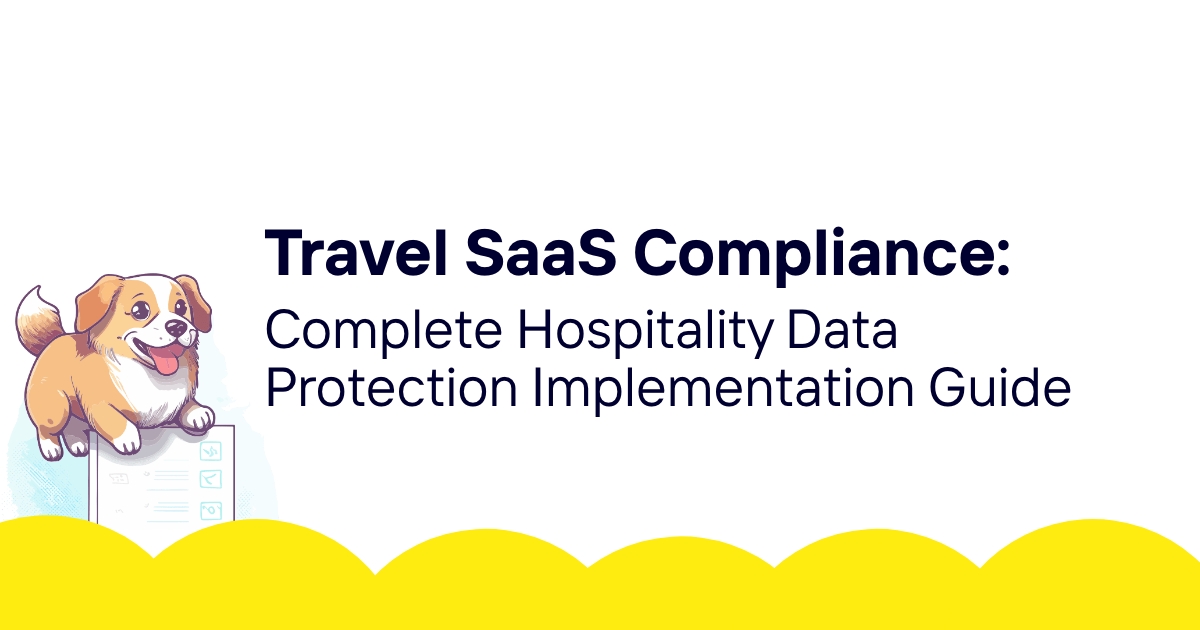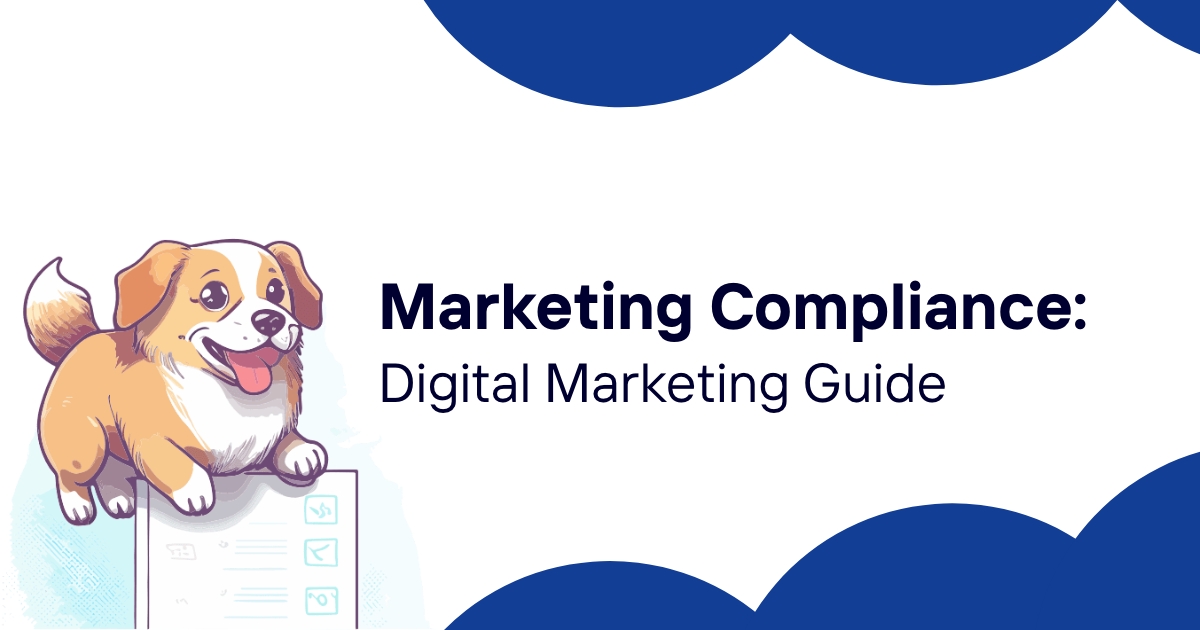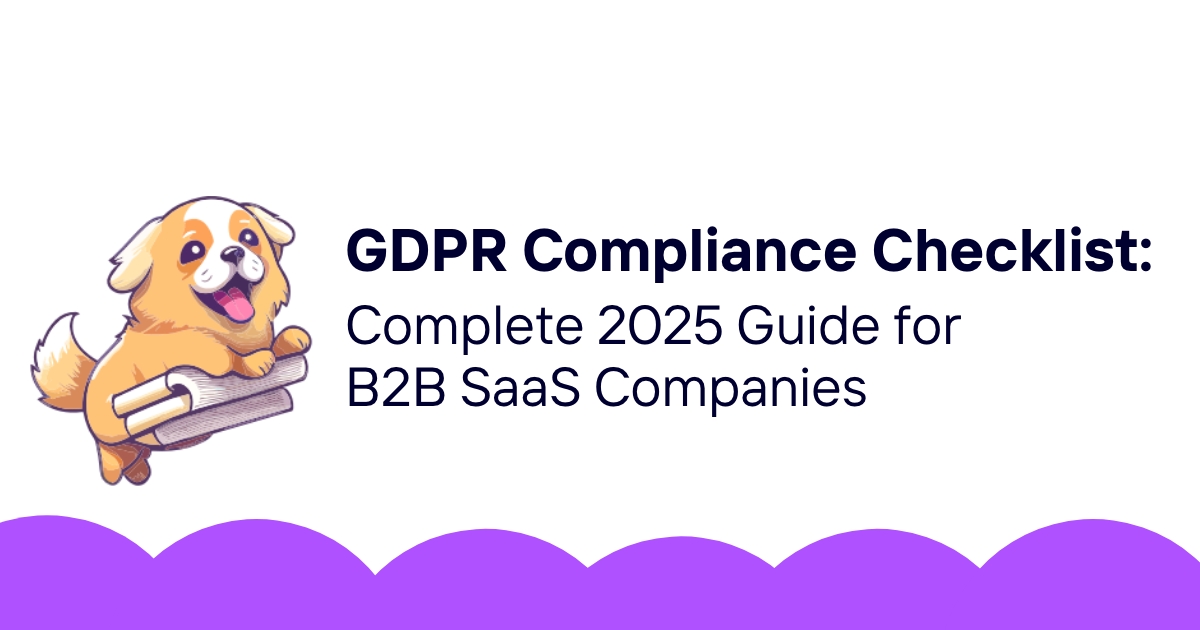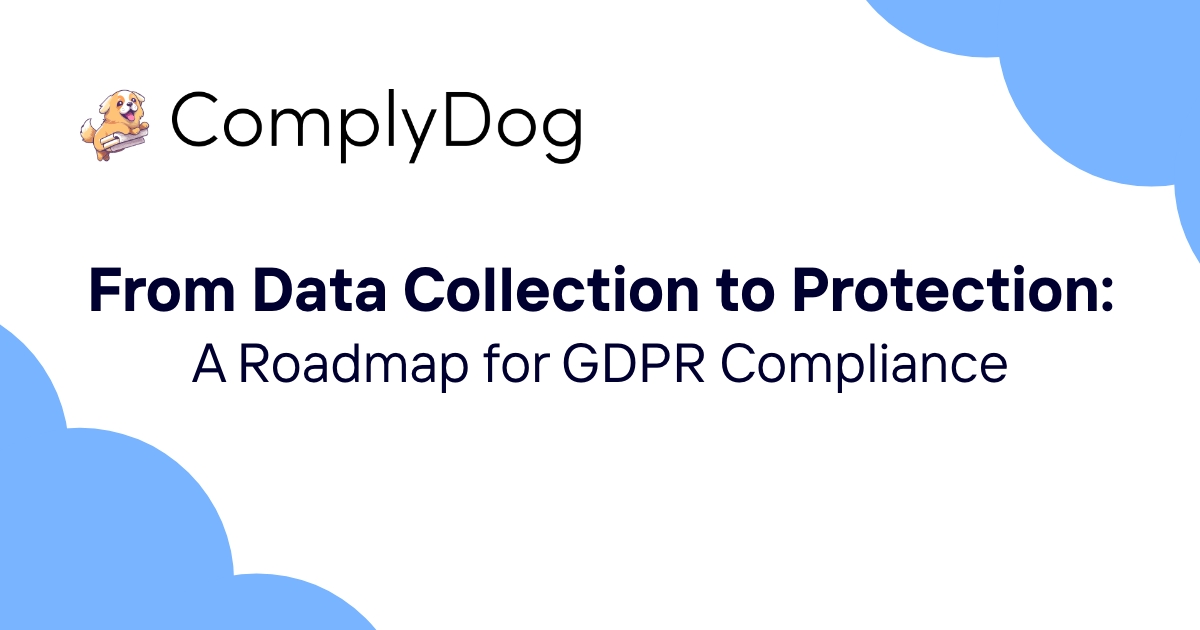Travel and hospitality SaaS platforms handle intensely personal data that reveals intimate details about people's lives, relationships, and circumstances. Every booking tells a story - where people go, who they travel with, how much they spend, and what they do when they think nobody's watching.
The travel industry operates across complex international boundaries where data protection laws, business practices, and cultural expectations vary dramatically. A single booking might involve data processing in dozens of countries as information flows between travelers, booking platforms, hotels, airlines, payment processors, and government agencies.
Travel compliance is getting more complex as privacy regulations expand globally and governments increase data collection requirements for security and immigration purposes. Travel platforms must balance customer privacy expectations with legitimate business needs and mandatory government reporting obligations.
The most successful travel SaaS companies build privacy protection into their core value proposition. They win customer trust by demonstrating strong data protection practices and help travel businesses navigate complex compliance requirements across multiple jurisdictions. ComplyDog helps travel platforms showcase their commitment to customer data protection through comprehensive compliance portals that build confidence with hospitality partners.
Travel and Hospitality SaaS Privacy Requirements
Travel platforms collect comprehensive personal data through multiple touchpoints, creating complex privacy compliance scenarios that require understanding both general privacy laws and travel-specific regulations.
Core Travel Data Categories:
- Traveler identity data - Names, dates of birth, passport information, nationality, emergency contacts
- Booking and itinerary data - Destinations, dates, accommodation preferences, travel companions, special requests
- Payment and financial data - Credit card information, billing addresses, expense reports, corporate account details
- Location and movement data - GPS tracking, check-in locations, travel routes, real-time location services
- Preference and behavioral data - Hotel preferences, dining choices, activity interests, loyalty program participation
Each data category faces different privacy requirements and business justifications. Identity data might be required for government reporting, while preference data for personalization might require explicit consent under privacy laws.
Travel Industry Regulatory Landscape:
Travel platforms must navigate overlapping regulatory frameworks that combine privacy protection with security, immigration, and industry-specific requirements:
- Privacy laws - GDPR, CCPA, and other personal data protection regulations
- Government reporting - Passenger name records, customs declarations, immigration requirements
- Financial regulations - Anti-money laundering, sanctions screening, payment processing rules
- Industry standards - Payment card industry requirements, hotel industry data protection standards
The challenge lies in building systems that satisfy all applicable requirements without creating operational inefficiencies or conflicting compliance obligations between different regulatory frameworks.
International Compliance Complexity:
Travel inherently involves international data flows as booking information, itineraries, and traveler data move between countries with different privacy requirements, security obligations, and business practices.
A traveler booking a European hotel through a US platform with a payment processor in Singapore creates data flows across multiple jurisdictions, each with potentially different privacy requirements and transfer restrictions.
Real-Time vs Historical Data:
Travel platforms process both real-time data for immediate booking and location services, plus historical data for loyalty programs, travel analytics, and customer relationship management. These different uses require different privacy compliance approaches.
Real-time location tracking for travel assistance might rely on legitimate interests or consent, while historical travel pattern analysis for marketing might require explicit consent under privacy laws.
For insights on managing complex international data flows, check out our gaming SaaS compliance guide which addresses similar cross-border compliance challenges.
Booking Platform Customer Data Management
Booking platforms collect extensive customer data to facilitate travel reservations while requiring careful privacy protection that balances personalization benefits with data minimization principles.
Booking Data Minimization:
Travel bookings often require substantial personal information for reservation confirmation, payment processing, and government reporting requirements. However, platforms should collect only data necessary for specific booking purposes.
Implement booking systems that tailor data collection to specific travel types and destinations. Domestic hotel bookings might require less personal information than international flights that need passport details for government reporting.
Travel Companion Privacy:
Travel bookings often include information about companions, family members, or colleagues who aren't direct platform users. This secondary personal data requires privacy protection even though these individuals haven't directly interacted with your platform.
Design booking systems with appropriate consent and notification mechanisms for travel companion data. Primary bookers should understand their responsibilities for companion data privacy, while platforms should minimize collection of unnecessary companion information.
Booking Modification and Cancellation:
Travel booking changes and cancellations require ongoing data processing that must respect privacy preferences while supporting legitimate business needs for customer service, refund processing, and dispute resolution.
Implement booking management systems with appropriate data retention policies that consider the travel booking lifecycle, including post-travel periods when data might be needed for customer service or dispute resolution.
Corporate Travel Privacy:
Business travel bookings create complex privacy scenarios where employee travel data is processed by corporate travel managers, expense management systems, and travel platforms while requiring protection of employee privacy rights.
Design corporate travel systems that respect employee privacy while meeting business needs for expense management, duty of care, and travel policy compliance. Consider role-based access controls that limit corporate access to employee travel details.
Travel Expense Management SaaS Compliance
Travel expense management platforms process detailed financial and travel data that requires privacy protection while supporting business expense reporting, tax compliance, and financial management requirements.
Expense Report Privacy:
Travel expense reports often contain detailed information about traveler activities, dining choices, entertainment expenses, and personal circumstances that require privacy protection beyond basic financial data.
Implement expense management systems that separate business-required financial information from personal details about traveler activities and choices. Expense categories might be necessary for tax reporting, but detailed merchant information might exceed business necessity.
Receipt and Documentation Privacy:
Digital receipt management and expense documentation often capture personal information through photos, location data, and merchant details that require privacy protection while supporting expense verification and audit requirements.
Design receipt management systems with appropriate image processing and data extraction that captures necessary business information while minimizing personal data exposure from receipt imagery and location tracking.
Corporate Card Integration:
Corporate credit card integration for expense management involves processing detailed transaction data that might reveal personal information about traveler activities and spending patterns requiring privacy protection.
Implement corporate card data processing with appropriate controls that distinguish between business-necessary transaction information and personal details that might be captured incidentally through payment processing.
Expense Approval Workflows:
Expense approval processes often involve sharing traveler expense data with managers, finance teams, and auditors who need appropriate access controls to protect employee privacy while supporting business expense management.
Design approval workflows with role-based access controls that provide necessary business information to approvers while protecting employee privacy from unnecessary scrutiny of personal travel details.
Hotel Management Software Data Protection
Hotel management systems process extensive guest data for reservations, service delivery, and customer relationship management while requiring privacy protection that balances personalization with guest privacy expectations.
Guest Profile Management:
Hotel guest profiles accumulate detailed preference information, stay history, and personal details over multiple visits that provide personalization opportunities but also create comprehensive privacy compliance obligations.
Implement guest profile systems with appropriate consent mechanisms for detailed preference tracking and behavioral analysis that goes beyond basic reservation management and service delivery needs.
Property Management System Privacy:
Hotel property management systems integrate guest data across multiple hotel departments including front desk, housekeeping, food service, and guest services, creating internal data sharing that requires privacy consideration.
Design property management data sharing with role-based access controls that provide necessary guest information to hotel staff while protecting guest privacy from unnecessary access to personal details.
Guest Communication Privacy:
Hotel guest communication through mobile apps, messaging systems, and service request platforms involves processing communication data that requires privacy protection while supporting guest service delivery.
Implement guest communication systems with appropriate retention policies and access controls that support service delivery while protecting guest communication privacy and preference management.
Hotel Analytics and Revenue Management:
Hotel revenue management and analytics systems often analyze guest booking patterns, spending behavior, and preferences to optimize pricing and service delivery while requiring privacy protection for detailed behavioral analysis.
Design hotel analytics with appropriate anonymization and aggregation techniques that provide business insights without creating detailed individual guest profiles that might exceed privacy law requirements.
Travel Analytics and Customer Profiling Privacy
Travel analytics platforms collect comprehensive behavioral data to understand travel patterns, optimize services, and support marketing efforts while creating significant privacy compliance challenges that require careful management.
Travel Pattern Analysis:
Travel analytics often analyze detailed travel patterns including destinations, timing, spending, and preferences to understand customer behavior and market trends. This analysis can reveal sensitive personal information about traveler circumstances and lifestyle.
Implement travel analytics with appropriate anonymization and aggregation techniques that provide business insights without exposing individual traveler patterns that might reveal sensitive personal circumstances.
Predictive Travel Analytics:
Travel platforms use predictive analytics to anticipate customer needs, optimize pricing, and personalize recommendations. These systems often make automated decisions about pricing, availability, and service offerings that affect customer experiences.
Document predictive analytics systems and provide transparency when automated decisions significantly affect travel pricing or availability. Under privacy laws like GDPR, automated decisions that substantially affect individuals require additional protections.
Cross-Platform Travel Integration:
Travel analytics often integrate data across multiple platforms including airlines, hotels, car rentals, and activity providers to create comprehensive travel profiles that require coordinated privacy compliance.
Implement cross-platform analytics with appropriate consent mechanisms and data sharing agreements that respect traveler privacy choices across different travel service providers and booking platforms.
Loyalty Program Analytics:
Travel loyalty programs often involve detailed behavioral analysis and spending pattern tracking that supports reward optimization and customer retention but requires privacy protection for comprehensive customer profiling.
Design loyalty analytics with appropriate consent and transparency mechanisms that allow travelers to participate in basic loyalty programs while choosing whether to participate in detailed behavioral analysis and targeted marketing.
International Travel Data Transfer Compliance
Travel inherently involves international data transfers as booking information, traveler data, and service coordination flow between countries with different privacy requirements and data protection standards.
Cross-Border Booking Data:
International travel bookings involve data transfers between travelers' home countries, destination countries, and service provider locations that must comply with multiple privacy frameworks and transfer restriction requirements.
Implement international booking systems with appropriate data transfer mechanisms including standard contractual clauses, adequacy decisions, or binding corporate rules depending on the countries involved in each booking transaction.
Government Reporting Requirements:
Travel platforms often must share traveler data with government agencies for immigration, customs, security, and tax purposes. These mandatory disclosures must be balanced with privacy protection and traveler notification requirements.
Document government reporting obligations clearly in privacy notices and implement appropriate technical and procedural controls to limit data sharing to what's legally required for each jurisdiction.
Hotel Chain Data Sharing:
International hotel chains and travel partnerships often involve data sharing between properties and corporate systems across multiple countries that require appropriate privacy compliance coordination.
Design hotel chain data sharing with consideration for local privacy requirements in each jurisdiction while supporting legitimate business needs for reservation management, loyalty programs, and customer service.
Travel Insurance and Assistance:
Travel insurance and assistance services often require sharing sensitive traveler data including health information, emergency contacts, and location data across international borders for legitimate assistance purposes.
Implement travel assistance data sharing with appropriate consent mechanisms and privacy protections that support emergency assistance while protecting sensitive health and location information.
Travel SaaS Vendor Risk Management
Travel platforms depend on complex vendor ecosystems including payment processors, government databases, hotel chains, and service providers that create extensive vendor risk management and privacy compliance obligations.
Travel Technology Integration:
Modern travel platforms integrate with dozens of technology providers including global distribution systems, payment processors, mapping services, and communication platforms, each creating potential privacy compliance risks.
Develop vendor assessment frameworks that address travel-specific privacy risks including international data transfers, government reporting requirements, and integration with regulated travel industry systems.
Third-Party Travel Services:
Travel platforms often integrate with airlines, hotels, car rental companies, and activity providers that process traveler data independently while requiring coordination for seamless customer experiences and privacy compliance.
Document third-party service relationships and ensure appropriate data processing agreements address privacy responsibilities throughout the travel service delivery ecosystem.
Payment and Financial Services:
Travel payment processing involves multiple financial services providers across different currencies and jurisdictions that must comply with both privacy laws and financial industry regulations.
Implement payment vendor management that addresses both privacy compliance and financial industry requirements including anti-money laundering, sanctions screening, and payment card industry standards.
Government and Regulatory Integration:
Travel platforms often integrate with government systems for immigration, customs, and security purposes that create unique vendor risk scenarios involving mandatory data sharing and government access requirements.
Document government integration requirements and implement appropriate technical and procedural controls that balance mandatory compliance obligations with privacy protection principles.
Ready to build trust with travelers and hospitality partners? Use ComplyDog and demonstrate your commitment to traveler data protection with a comprehensive compliance portal that addresses travel-specific privacy requirements and builds confidence in your travel platform.


















